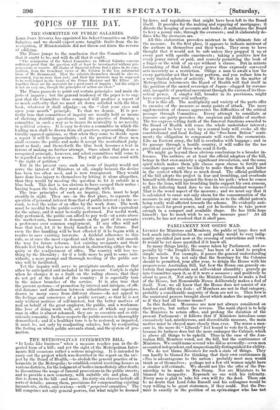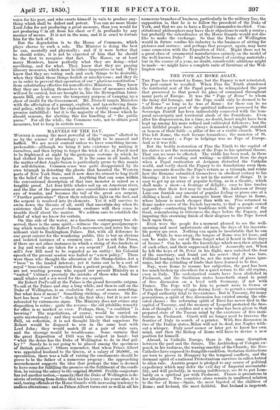PARLIAMENT NOT GOING MAD LUCKILY for Ministers and Members, the
public at large does not look much into division-lists, or said public would be very indig- nantly mystified just now at the crossing of convictions and votes. It would beet more mystified if it knew all.
In many things lately, the course taken by Parliament, and es- pecially by " the People's House," has been of a kind to perplex simple minds. For example, it passes the general understanding to know how it is, not only that the Secretary for the Colonies should be permitted, year after year, to detain the House with his preposterous Australian Bill, but how the House can gravely en- tertain that impracticable and self-evident absurdity; gravely go into Committee upon it, as if it were a measure ; and positively be about to pass it. Not only is the Minister licensed to make a fool of the House, but Honourable House deliberately makes a fool of itself. Now, we all know that the House does not consist of six hundred and fifty-six fools : all Members are not in that category, probably a considerable majority of them are not so. Then how is the unnatural process brought about which makes the majority act as if they had all become insane ? In this fashion. Measures are now not always considered on their merits, but rather the reverse. The main object is to help the Ministers to retain office, and prolong the duration of the present Parliament : it follows that if Ministers introduce some excessively bad, mischievous, and discreditable measure, the main. motive must be obeyed more closely than ever. The worse a mea- sure is, the more do " Liberals " feel bound to vote for it, precisely because its badness does but the more endanger the Cabinet, which is above all things to be upheld. Thus in the ease of the Aus- tralian Bill, Members voted, not the bill, but the continuance of Ministers. We could name several who did so avowedly—even men accounted independent, and unquestionably distinguished for ability. We do not blame Ministers for such a state of things. They can hardly be blamed for thinking that their own continuance in office is advantageous to the nation : probably most men would think so of themselves ; perhaps not a few old women might have a similar self-estimate. We should not like the offer of the Pre- miership to be made to Mrs. (lamp. Nor are Ministers to be blamed for incapacity. Reproach no one with his infirmity. Every man is glad to take his own will for the deed. There can be. no doubt that Lord John Russell and his colleagues would be very willing to be great statesmen, if they could. But the Pre- mier is exactly in the position of an opera-singer who has not
voice for his part, and who exerts himself in vain to produce any- thing which shall be dulcet and potent. You can no more blame Lord John for not producing a great measure, than you would for not producing C in alt from his chest or C in profundis by any manner of means. It is not in the man, and it is cruel to torture him for the lack of it.
But the degradation is to the House of Commons, which plays chorus to such a solo. The Minister is doing the best he can, mentally and physically; and if it were better that he should retire, it is not be expected of him that he should be the first to recognize that fact. The House, or at least many Members, know perfectly what they are doing—what sacrificing, and for what. They know that they are passing illusory measures, which must be either inoperative or bad. They know that they are voting such and such things to be desirable, when they think those things foolish or mischievous ; and they do so in order to prevent that operation of our " glorious constitution " from substituting effective for non-effective Ministers. They know that they are lending themselves to the farce of measures which will not be carried, but are brought in, like the Metropolitan Inter- ments Bill, only to serve the temporary purpose of vamping up a show of credit for the Government. Mr. Disraeli taunts Ministers with the affectation of a prompt, explicit, and tax-relieving finan- cial policy, while in fact the explanation is tardily completed, the promise unfulfilled : but it is the majority of the House which he should censure, for abetting this lax handling of " the public purse." For all the while, the Commons vote, not to obtain good measures, but to keep in certain men.



























 Previous page
Previous page